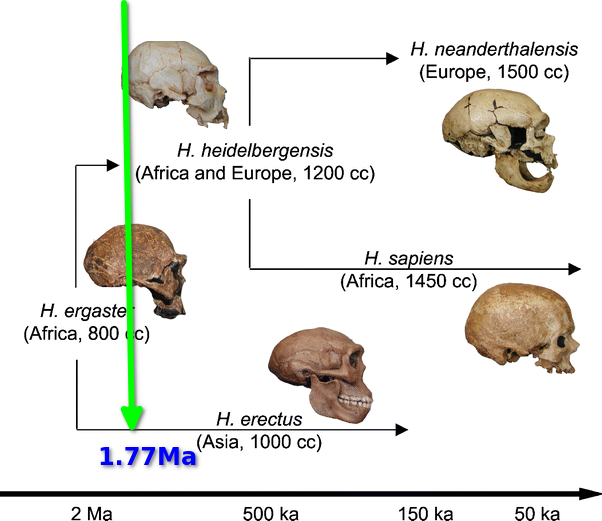Discoveries about a young ancestor's teeth may shed light on the upward trend in brain size over millennia.
Other explanations
Bipedalism developed long before bigger brains, and the use of tools was widespread in earlier hominid branches. As a result, these causes have been ruled out as the main driving force in brain evolution, despite being essential preconditions. https://efossils.org/book/bipedalism-vs-brain-size
Preteen teeth
The recent study of the 1.77 Million-year-old remains of an 11 to 12-year-old early homo from the Dmanisi site in Georgia is significant. https://phys.org/news/2024-11-fossil-teeth-childhood-prelude-evolution.html. This study of dental development throws some light on another human oddity, which is our very extended childhoods. The fossil's age places it close to the emergence of larger brains in our ancestors. A useful timeline is found here https://australian.museum/learn/science/human-evolution/larger-brains/
For context that's around this point in Human Evolution

Modern Human life history is distinguished by a prolonged childhood in which mental and somatic development rates diverge. This slow development is crucial for developing high cognitive abilities in our socially complex species.
A slowing childhood in a supportive family and cultural transmission
This individual experienced rapid growth in their first five years, faster than in apes. For example, their wisdom teeth fully emerged at 12 years of age compared to 17-24 today. This rapid growth was unexpected given the age of the fossil and its relationship to modern humans. However, the teeth did have a sequence of growth similar to modern humans. Marcia Ponce de León from the University of Zurich and co-author of the study commented "Milk teeth were used for longer than in the great apes and the children of this early Homo species were dependent on adult support for longer than those of the great apes". She suggests that "This could be the first evolutionary experiment of prolonged childhood".
It is believed that children's development slowed as cultural transmission increased, making the quantity of knowledge conveyed from old to young more crucial. This transmission would have allowed them to make greater use of available resources while developing more sophisticated behaviours, providing them with an evolutionary advantage.
The demands of large brains cause Humans to develop more slowly than our closest animal cousins. Energy directed toward the brain dominates the human body's metabolism early in life, which is possibly one other reason why humans develop at a rate more akin to a reptile than a mammal in early childhood. A five-year-old's brain is a real energy monster. It uses twice as much glucose as a fully grown adult. See https://www.sciencedaily.com/releases/2014/08/140825152558.htm
What does this explain?
However, just identifying some of the forces influencing the brain's evolution does not account for the emergence of more recent advances such as symbolic language. https://www.britannica.com/science/human-evolution/Language-culture-and-lifeways-in-the-Pleistocene Nonetheless, the brain's expansion was an essential precursor to the richness of human culture. Even in this early era of human evolution where children needed to mature rapidly, and life expectancy was low, adult care exerted a protective effect.
Additional Info
A variety of circumstances probably influenced brain development, including contributions from diverse hominid lineages with larger brains that were previously lumped into a single smaller smaller-brained species. Ian Tattersall provides a nuanced discussion of brain size and how it relates to humanities tangled origins in this 2023 article: Endocranial volumes and human evolution, https://pmc.ncbi.nlm.nih.gov/articles/PMC10517302/
